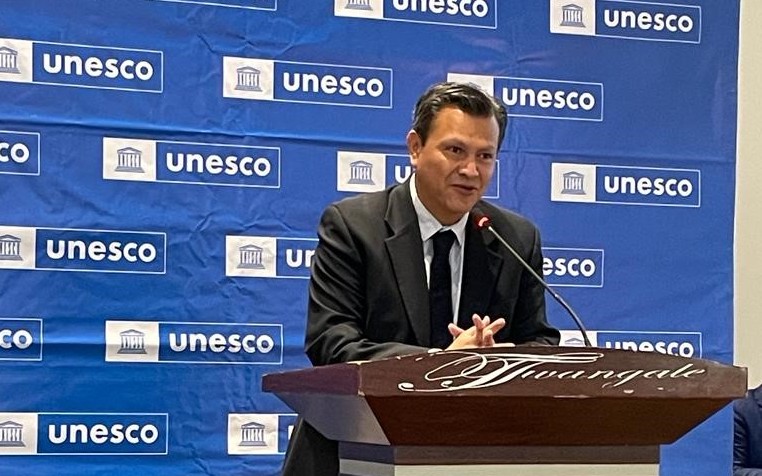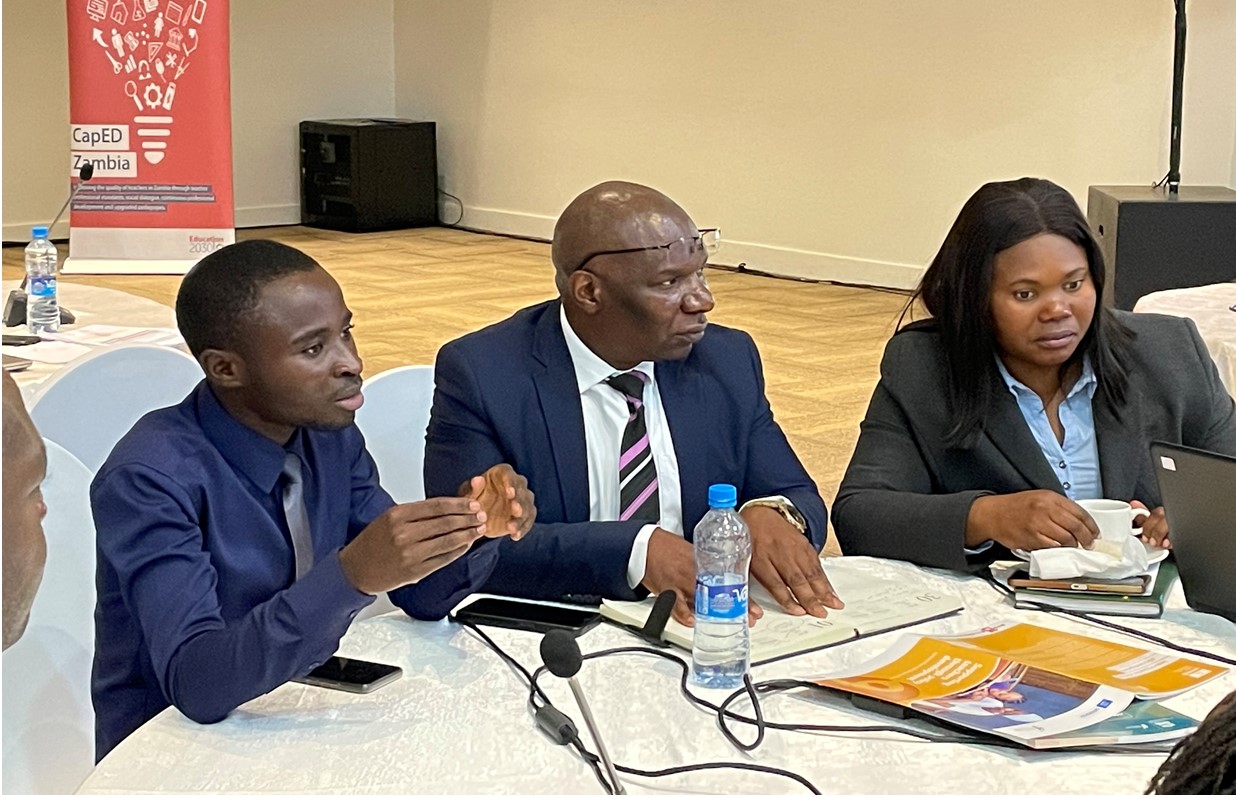Teachers have an essential part to play in building a better future in sub-Saharan Africa. To play that part well, they need to be supported and empowered through good policy and robust social dialogue.
From 20 to 23 June 2023, the UNESCO Section for Teacher Development and the International Task Force on Teachers for Education 2030 (Teacher Task Force, TTF), in collaboration with the UNESCO International Institute for Capacity-Building in Africa (IICBA) and the Regional Office for Southern Africa (ROSA), conducted two training workshops in Lusaka to help address the challenges faced by teachers in Zambia. The first workshop built capacity among members of the ministerial technical committee selected to lead the development of a comprehensive teacher policy. The second focused on institutionalizing social dialogue and empowering teachers and their unions to more actively participate in policy development.
These workshops followed a national stakeholder consultative meeting on the status of teachers, organized in December 2022, at which the Minister of Education launched the National Framework for Social Dialogue for Teachers, and during which participants began deliberations on the development process for a new teacher policy. After this successful beginning, the June workshops brought together key stakeholders, including representatives from the Ministry of Education (MoE), the Teaching Service Commission, the Teaching Council of Zambia, teacher unions, civil society organizations and development partners, to collectively work towards strengthening the teaching profession to improve the quality of education. The workshops were led by UNESCO's Section for Teacher Development and the TTF and funded through UNESCO’s Capacity Development for Education (CapED) Programme that has been active since 2003 with a focus on least developed countries, currently financed by Finland, France, Iceland, Norway, and Sweden.
Paving the way for a comprehensive teacher policy
Teachers play a crucial role in shaping the future of Zambia, but the country is grappling with challenges such as teacher shortages, declining interest in joining the profession and low teacher morale. To better position the MoE to attract, develop and retain quality teachers, the government solicited UNESCO’s support in February 2022 to develop a comprehensive teacher policy and accompanying implementation guidelines and tools. The first workshop in June 2023 was carried out to help drive that mission forward. On the urgent need for high-quality teachers, Joel Kamoko, Permanent Secretary for Educational Services at the Ministry of Education of Zambia, said, ‘The quality of an education system cannot exceed the quality of its teachers [as] teachers provide the power of education to today’s learners, thereby giving them the possibility for a better future ahead.’
The training made use of the Teacher Policy Development Guide to provide guidance on designing a comprehensive teacher policy tailored to Zambia’s specific needs. Carlos Vargas, Head of the Secretariat of the Teacher Task Force and Chief of Section for Teacher Development at UNESCO, spoke about the potential of the workshop to drive change, saying, ‘The development of a comprehensive teacher policy is vital for addressing the issues hindering teacher quality and availability in Zambia. By supporting the Technical Committee members, we are taking a significant step towards ensuring quality education for all.’

The workshop took a participatory approach, with presentations made by UNESCO, TTF, IICBA, MoE, Education International and local education stakeholders. Speakers covered the importance of contextualizing policy and unpacked the different dimensions impacting the teaching profession, including recruitment and retention, teacher education, deployment, teacher career structures, working conditions, remuneration, standards, accountability and school governance. The main steps for developing and validating a teacher policy were also discussed. Through group discussions and plenary sessions, technical committee members had in-depth conversations and shared insights on key teacher challenges, potential policy actions and solutions and current opportunities on which to build in developing the country’s first national comprehensive teacher policy.
Participants also benefited from experiences shared by speakers from other countries in sub-Saharan Africa that have developed comprehensive teacher policies using the Teacher Policy Development Guide with UNESCO and TTF support. These speakers included Jonathan Kamwana, Commissioner of Teacher Education, Training and Development at Uganda’s Ministry of Education and Sports, and Yaw Ankomah, Senior Lecturer in Educational Planning and Leadership at the Institute for Educational Planning and Administration at the University of Cape Coast, who was a member of the technical committee for Ghana’s comprehensive teacher policy.
By the end of the workshop, committee members had enhanced their technical capacities, gained a better understanding of teacher challenges and acquired knowledge on framing a comprehensive teacher policy. The training also facilitated the identification of a roadmap with milestones for policy development, including the definition of a diagnostic study on teacher issues. A report summarizing the workshop’s outcomes will serve as a valuable resource for reference and basis for further collaboration.
Sparking dialogue for education transformation
Social dialogue that brings together government institutions, employers, teachers and their organizations in genuine exchange is essential to creating a teacher policy that addresses the concerns of all stakeholders. Therefore, building on the launch of Zambia’s new National Framework for Teacher Social Dialogue last year, the second workshop aimed to strengthen social dialogue by building the technical and organizational capacity of teacher unions and education sector personnel.
According to Permanent Secretary Joel Kamoko, ‘Social dialogue is a vital mechanism for achieving quality education for all. Teachers are responsible for implementing educational reforms, and their engagement in social dialogue contributes to the achievement of key aspects of educational objectives and policies, including teachers’ professional development programmes.’
At the workshop, national and international consultants and UNESCO representatives made presentations, providing a platform to discuss the importance of social dialogue in improving the teaching profession’s status and the quality of teaching, in alignment with the Education 2030 agenda. Participants gained insights into effective responses and lessons from other national social dialogue frameworks. Gender issues, especially ways to promote equality and equity within the teaching profession, provided another key topic.

The training workshop on social dialogue marks a significant milestone in promoting meaningful engagement between education stakeholders and giving teachers a voice in shaping education policies. Through this effort, Zambia is taking a crucial step towards fostering a conducive teaching and learning environment, improving the teaching profession and enhancing teacher quality and working conditions.
On the workshop’s potential impact, Carlos Vargas said, ‘By empowering teachers and education sector personnel through enhanced social dialogue, we can collectively work towards improving the teaching profession and creating an environment that supports quality education for all.’
Driving positive change in Zambia’s education landscape
Both workshops represented important steps towards addressing the challenges faced by teachers and improving the education landscape in the country. By promoting collaboration, inclusivity and the exchange of ideas, these workshops have paved the way for a more equitable, high-quality education system in Zambia.
Moving forward, UNESCO will provide assistance in Zambia to conduct a comprehensive diagnostic study as part of the teacher policy development process. Following the launch of the National Framework for Teacher Social Dialogue in 2022, a pilot programme on social dialogue has been successfully conducted in two specific provinces, benefiting 200 teachers. UNESCO will continue its support to define the implementation of the framework before its nationwide rollout.
For more information about UNESCO’s work on teachers, click here. To explore related resources and materials on teacher policy and social dialogue, follow the links below: